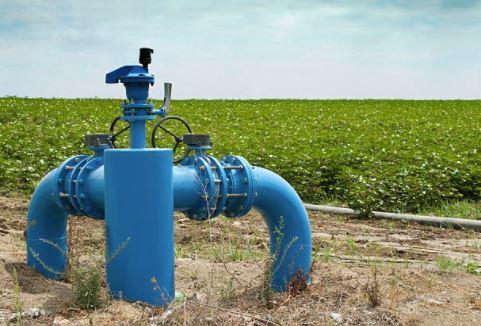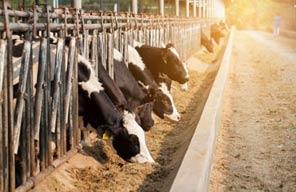Pumping Applications in the Agriculture Industry
Learn about the various pumping applications within agriculture and how DAE Pump can help solve challenges of the industry. Browse our Pump SelectionAgricultural Pump Applications
Our pumps are efficient, tested for reliability and designed to work flawlessly with present-day irrigation systems as well non-agricultural applications. We can source pumping solutions for agriculture, irrigation systems, and livestock applications that help to protect the water resource, reduce energy costs and maintain production at an optimum level. We offer the industry’s best line of slurry and centrifugal pumping systems to meet these requirements.
Common Agricultural Pump Applications
- Livestock water transfer
- Domestic water
- Small irrigation
- Village water supplies

Agriculture Pump Uses
Livestock Water Transfer
Livestock water transfer relies on the use of water pumps to ensure livestock are properly taken care of with enough water for drinking and bathing.
Pump Applications: Centrifugal Pump
Domestic Water
 Domestic water supply relies on the use of agricultural and municipal pumps to ensure fresh, clean water is delivered to the home plumbing systems.
Domestic water supply relies on the use of agricultural and municipal pumps to ensure fresh, clean water is delivered to the home plumbing systems.
Pump Applications: Centrifugal Pump
Irrigation
 Crops and livestock are the beating heart of the agricultural industry, thus water for irrigation is extremely important to keep the industry productive.
Crops and livestock are the beating heart of the agricultural industry, thus water for irrigation is extremely important to keep the industry productive.
Pump Applications: Self Priming Surface Pumps
Village Water Supplies
Water pumps can also be used to help deliver crucial village water supplies to towns and villages in rural areas. Depending on the pressure of the application and pump type, pumps operate often with a booster pump to ensure reservoirs are filled. Booster pumps assist in transferring water between storage tanks, ponds, and reservoirs and to ensure an irrigation system operates consistently.
Pump Applications: Centrifugal Pump
The Benefits of Agricultural Irrigation Pumps
Agriculture has been the backbone of human civilization for millennia, and as populations grow, so does the demand for high efficiency and sustainable farming practices. Among the myriad tools and technologies that have revolutionized agriculture, irrigation pumps stand out as key to any solid irrigation system. When equipped with a flexible impeller, these pumps become self priming, perfect equipment to install in a pond or streams for consistent pumping at pressure. Agricultural water pumps offer numerous benefits that enhance productivity, conserve water, and ensure the reliability of crop yields while offering low maintenance requirements.
1. Enhanced Crop Yields
One of the most significant benefits of using irrigation water pumps in the agriculture industry is the substantial increase in crop yields. Consistent and adequate water supply from either streams, lakes or reservoirs is crucial for optimal plant growth. An irrigation pump ensures that crops receive the right amount of water at the right time with the desired flow rate, minimizing the risks of drought stress and enabling plants to reach their full potential. This consistent water supply translates to healthier plants and higher yields, which is especially important in regions with unreliable rainfall or a lack of lakes, shallow wells or another easily accessible water source.
2. Efficient Water Management
Water is a precious resource, and its efficient use is paramount in the agriculture industry for almost any irrigation system. Many farms use irrigation pumps (such as a self priming centrifugal pump) to allow for precise control over water distribution in irrigation systems, reducing wastage and ensuring that liquid reaches the root zones where it is most needed. Modern irrigation systems, such as sprinkler or drip irrigation systems, can be integrated with self priming centrifugal pumps and booster pumps to optimize water and power usage further. This equipment provides efficiency that not only conserves water, but also reduces the costs associated with water usage and pumping.
3. Extended Growing Seasons
In regions where natural precipitation is seasonal, farmers can quickly employ high pressure irrigation water pumps equipped with suction lines and a flexible impeller to extend their growing seasons beyond the limitations imposed by climate and water source. By providing a consistent water supply at pressure, these pumps allow farmers to cultivate crops throughout the year, leading to multiple harvests and increased productivity (with or without a booster pump). This capability is particularly beneficial in arid and semi-arid regions, where agriculture would otherwise be severely restricted.
4. Increased Agricultural Flexibility
Irrigation water pumps offer farmers greater flexibility in their farming practices. With a reliable pump installation forming the backbone of an irrigation system (that may include a booster pump), farmers can diversify their crops for maximum efficiency, experiment with high-value crops, and implement a broad range of crop rotation strategies that enhance soil health. This flexibility can lead to a more resilient farming operation, capable of adapting to changing market demands and environmental conditions.
5. Mitigation of Drought Impacts
Drought is a major threat to agriculture, often leading to significant crop losses and economic hardship for farmers. Most irrigation systems use a centrifugal pump to serve as a critical tool in drought mitigation by providing a dependable water source when natural rainfall is insufficient. By maintaining soil moisture levels, irrigation water pumps help to protect crops from the adverse effects of drought, ensuring more stable food production and income for farmers.
6. Improved Soil Management
Consistent irrigation helps maintain optimal soil moisture levels, which is essential for soil health. Properly managed irrigation prevents soil erosion, reduces salt buildup, protects the water supply, and maintains soil structure, promoting better root development and nutrient uptake by plants. Using a submersible pump (including any other centrifugal pump type, including self priming centrifugal style with flexible impeller) in a pond enables farmers to move gallons of water to sprinklers via a piping system for quality yields. This results in more robust and healthy crops, as well as improved long-term soil fertility.
7. Economic Benefits
Investing in irrigation water pumps (such as a submersible pump) can fuel significant economic returns for farmers. Higher crop yields and extended growing seasons can fuel increased farm income. Additionally, efficient water management reduces water-related costs. In some cases, the use of water pumps attached to irrigation pipelines (with a booster pump if necessary) can also lead to the cultivation of higher-value crops, further enhancing profitability. Over time, the initial investment in irrigation equipment infrastructure – including the installation of booster pumps, suction lines and drip irrigation systems that move gallons of liquid daily – is often outweighed by these economic benefits.
8. Environmental Sustainability
Modern irrigation water pumps, when used in conjunction with efficient irrigation practices, contribute to environmental sustainability. By optimizing water use and reducing waste, these reliable pump systems help to conserve water resources such as lakes, ponds and streams and protect natural ecosystems and drinking water. Additionally, some irrigation water pumps operate using an electric motor (instead of a diesel engine) that uses renewable energy sources, such as solar power, reducing the carbon footprint of any irrigation system.
Must-Have Features and Important Functions of A Centrifugal Agricultural Irrigation Pump
Centrifugal pumps are the workhorses of agricultural irrigation, known for their efficiency, reliability, and versatility. These water pumps play a critical role in modern farming by ensuring a consistent and efficient water supply. When selecting a centrifugal pump for agricultural irrigation, it’s essential to understand the key features and functions that make these water pumps effective. This article will discuss the must-have features and important functions of centrifugal agricultural irrigation water pumps.
1. High Efficiency
Efficiency is paramount in irrigation systems to minimize energy consumption and operational costs. Centrifugal pumps were originally designed to convert mechanical energy into hydraulic pumping energy effectively, resulting in high flow rates and pressure. Look for water pumps with high-efficiency ratings, as these will reduce electricity or fuel costs and provide more suction and water output for the energy input.
2. Robust Construction
Agricultural environments can be harsh, with exposure to dust, mud, and varying weather conditions. A centrifugal pump must have a robust construction to withstand these challenges. Key materials include:
-
Corrosion-Resistant Materials: Pumps should be made from materials like stainless steel, bronze, or high-grade cast iron to resist corrosion caused by water and fertilizers.
-
Durable Seals and Bearings: These components should be able to handle the wear and tear of continuous operation in tough conditions.
3. Self-Priming Capability
Self-priming centrifugal pumps are highly advantageous in agricultural settings, where the water source may be at varying levels. These water pumps can automatically remove air from the pump and suction line, making it easier to start and maintain the pump without manual priming. This feature is particularly useful in areas with fluctuating water levels or in remote locations where manual intervention is challenging.
4. Variable Speed Drives (VSD)
Variable Speed Drives (VSD) allow for precise control of the pump’s motor speed, providing several benefits:
-
Energy Savings: By adjusting the pump speed to match the required flow rate, you can quickly employ VSDs to significantly reduce energy consumption.
-
Improved Performance: VSDs help maintain optimal operating conditions, reducing wear and tear on the pump and extending its lifespan.
-
Adaptability: They enable the pump to adapt to changing irrigation needs, such as varying crop water requirements or different irrigation schedules.
5. High Flow Rate and Pressure Capacity
Centrifugal pumps must provide sufficient flow rate and pressure to meet the irrigation system’s demands, or may require a booster pump to help. The pump should be capable of delivering water over long distances and elevations, especially in large agricultural fields. It’s important to select a pump with the appropriate specifications to ensure it can handle the required irrigation load without compromising performance.
6. Easy Maintenance and Serviceability
Agricultural operations cannot afford extended downtime due to pump failures. Therefore, self priming centrifugal pumps should be designed for easy maintenance and serviceability:
-
Accessible Components: Key parts such as seals, impellers, and bearings should be easily accessible for inspection and replacement.
-
Simplified Design: A straightforward design with fewer moving parts can reduce the likelihood of mechanical failure and simplify repairs.
7. Compatibility with Various Water Sources
Agricultural pumps must be versatile enough to handle different water sources, including wells, rivers, ponds, and reservoirs. The pump should be able to manage varying water qualities, including those with sediments or debris. Features such as strainer screens and durable impellers can help the pump handle these conditions effectively, ensuring the proper suction and the best possible total dynamic head.
8. Noise and Vibration Control
Centrifugal pumps should operate quietly and with minimal vibration to reduce noise pollution and prevent damage to the pump and surrounding infrastructure. Features that help achieve this include:
-
Balanced Impellers: Properly balanced impellers reduce vibration and noise.
-
Sound-Dampening Materials: Incorporation of sound-dampening materials in the pump housing can further minimize noise levels.
Important Functions of Centrifugal Agricultural Irrigation Pumps
1. Water Distribution
The primary function of a centrifugal irrigation water pump is to distribute water evenly and efficiently across the agricultural field. A common application is to install a high suction self priming centrifugal pump in a pond to ensure quality pressure. This ensures that all crops receive the necessary water to grow optimally, leading to higher yields and better crop quality.
2. Pressure Regulation
Centrifugal pumps help regulate the pressure in irrigation systems, ensuring that water is delivered at the right levels to different parts of the field. This is crucial for systems like drip or sprinkler irrigation, which require specific pressure levels to function correctly.
3. Irrigation Scheduling
Modern centrifugal pumps (sometimes with the aid of a booster pump) and suction lines can be integrated with automated irrigation systems, allowing for precise scheduling, power take off and control (sometimes with optimal total dynamic head). This ensures that crops receive water at the optimal times, reducing water wastage and enhancing crop growth.
4. Adaptability to Changing Conditions
Centrifugal pumps must be adaptable to changing environmental conditions and irrigation needs. This includes handling fluctuations in water levels, adjusting to different crop requirements, and responding to varying weather patterns.
Conclusion
Centrifugal agricultural irrigation water pumps are the engine of modern farming, offering efficiency, reliability, and versatility. By understanding the must-have features such as high efficiency, robust construction, self-priming capability, variable speed drives, and easy maintenance, farmers can select the right pump to meet their specific needs. Additionally, recognizing the critical functions of these pumps, including water distribution, pressure regulation, irrigation scheduling, and adaptability, ensures that irrigation systems operate effectively and sustainably. With the right centrifugal pump, farmers can enhance their irrigation practices, leading to improved crop yields and overall agricultural productivity.
Related Agriculture Pump Articles
Learn more about agricultural pump uses:
Looking For the Best Agricultural or Irrigation Pump?
Types of Agriculture Pumps
- Centrifugal Pumps
- Diaphragm Pumps
- Pulp Pumps
- Process Pumps
- Water Pumps




